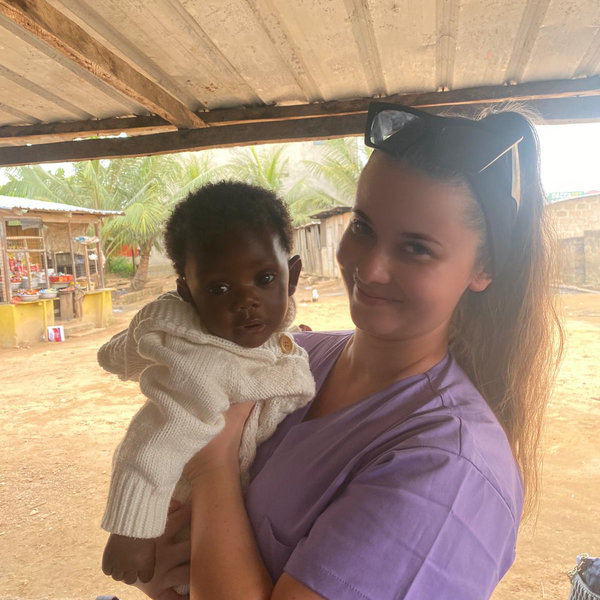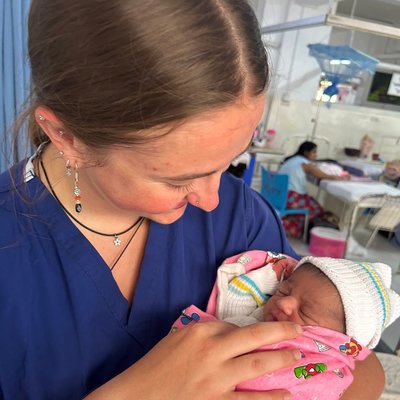Sheffield Hallam Univeristy 2013
I chose Work the World because they are well known for being a reputable healthcare elective organisation. Tutors at the university that I attend also recommended Work the World. This was reaffirmed by the fantastic feedback that I heard from students who had used them, and from case studies on Work the World website. I was going on my elective by myself, and felt much more reassured knowing that Work the World had organised everything, than if I had done it myself!
Work the World provided brilliant support and advice to me before my trip. The website timeline on the ‘mytrip’ login was very helpful at reminding me of the tasks that needed completing on the run up to my departure, for example: telling me when it was time to visit the practice nurse and arrange my vaccines. Regular phone calls from the Work the World team were really informative and allowed me to ask any questions. Someone was always available to talk to, either over the phone or by email. The information pack was also VERY helpful! I stuck to the packing list and didn’t feel that I was missing anything when I was there. And most importantly they reassured me when I was feeling nervous, and made me feel excited instead!
I saw a variety of patients on this ward, such as those with HIV, Malaria, TB, and bacterial meningitis
I arrived in Dar es Salaam early in the morning, about 6:30am local time. I was very lucky and didn’t have to wait long for my visa or luggage. As soon as I got through the arrival gates, I spotted Mark, the assistant programme manager waiting for me in his Work the World t-shirt. Mark was very welcoming and we travelled safely to the house by taxi. The orientation to the house and local area was very thorough, informative and enjoyable. Mark also travelled with each of us to our placement area two days running, which I found really helpful. While at the hospital he gave me a good tour around the different departments, and introduced me to different staff members.
The Work the World house was really comfortable, and it was nice to relax there when you had free time, especially relaxing by the swimming pool! Do bare in mind that there is no air conditioning in the house, so it can be very warm, but this allows you to acclimatise and be prepared for the same heat you will be experiencing in the hospital. We had great fun at the house, there was a BBQ every Thursday, the food was amazing and we loved learning African dances!
The staff at the house were brilliant, so helpful and friendly. The cook that lived there made beautiful food and juice, we never went hungry, and there were always leftovers for lunch the following day!
Hospital placement
Before my departure to Tanzania, the staff at Work the World rang me to tell me all about the different placement options. I chose to work at a regional hospital, two weeks in Internal Medicine and one week in Casualty/Outpatients.
I spent the first two weeks on the female internal medicine ward. Mark introduced me to my supervisor, and she was very friendly and welcoming. The staff on the ward were very friendly towards me, and some of them spoke relatively good English. The Swahili lessons taught in the Work the World house are really helpful, and I found that just learning the basics allowed me to feel welcomed on the ward.
There is no doubt that what you will witness in the hospital will be tough and a massive culture shock, but a fantastic experience. I saw a variety of patients on this ward, such as those with HIV, Malaria, TB, and bacterial meningitis. I attended the doctor’s ward rounds, and assisted with the nursing duties – such as catheterising patients and providing last offices.
When I finished the two weeks on internal medicine I asked one of the senior nurses if she would mind writing me a testimony, I just needed to assist her with the English spelling of some words. I felt like this was a really valuable piece of evidence to add to my portfolio when I got home.
I then spent one week in the Casualty/Outpatients department. I met my supervisor for this department and she gave me a very thorough orientation to the different parts of the department, such as the waiting area, consultation rooms, minor theatre, and resuscitation rooms.
On my first day I assisted with successful CPR of a young malnourished girl aged 22, who had TB. The doctor was very compassionate, and gave strong chest compressions. Myself and a nurse gave the rescue breaths using a bag valve mask, which kept falling apart, as it was broken! When the girl took a breath, I felt so overwhelmed with happiness! The doctor cheered and gave me a high-five! It was an experience that I will never forget.
I spent two days in the minor theatre. I found this a tough place to work because a lot of the procedures that took place were done with no anaesthetic, and I found this a challenge to watch, it was still an unforgettable and great experience. I saw a man who had got his hand stuck in a machine, various road traffic accident victims, and a boy with a haematoma in his face! Finally, I saw an 8 year old boy, who had a large burn on the whole of his back, due to a pan of soup falling on him. The boy was in absolute agony, and his mother had to wait outside the theatre while the two nurses treated his back. This involved removing all of the damaged skin from his back. The boy was screaming and sobbing due to the pain. I cried while watching this procedure, as I found it so difficult to watch a young boy in so much pain, and being given no comfort at all – something very different to what you would see in England! Another patient came into the minor theatre shortly after, and one of the nurses had to go and treat them, so I had to help the other nurse to treat the young boy. The nurses couldn’t understand why I was crying, and why I held his hand to comfort him, as this is a massive culture difference. The following day the young boy came back to have his back re-dressed, him and his mother were so happy to see me, I didn’t realise until this moment that I had made a difference by comforting him and showing empathy, this is something that the patients are not used to receiving from the Tanzanian staff. Having said that, this is not because the Tanzanian's are cruel or uncaring, it is just a difference in the culture.
While in the consultation rooms I was taught how to cannulate patients, and accomplished this twice, and also catheterised another patient, and administed an intra-muscular injection –which I had not done before.
After completing my placement in Casualty/Outpatients, I once again asked my supervisor in this department if she could write me a testimony. She did this for me, with a little assistance on the spelling of English words
Seeing the young girl be successfully resuscitated, and the happiness that I shared with the doctor in that moment. Also, the difference that I felt that I made to the young boy who was burnt.
I had two weekends while on my trip. On the first weekend I went to Zanzibar island with three of the girls from the house. We travelled there on the ferry which took about an hour and a half. We spent one night in Jambiani, which was paradise! The hotel was called Blue Oyster, was very good value for money. We went in to the village in Jambiani and met local children who were so friendly and cute! We went swimming with dolphins, which was fantastic! We then travelled to Stone Town and spent two nights there. We went on a spice tour, went to the lovely food market at night, watched the sunset from a rooftop bar, and did some shopping!
On my second weekend I went on a safari to Mikumi national park! The tour guide, Thomas and his colleague, Happy, picked me up from the house in the safari jeep, very early in the morning, and we did the 7 hour drive to Mikumi. We stopped for food on the way, which was included in the price. I had a brilliant time on the safari; I saw monkeys, giraffe, zebras, hippos, elephants, gazelle, buffalo, and wilderbeast! We stayed in a local motel for the night, and went on another game drive the following day before travelling back to Dar es Salaam.
Advice for future students
Don’t be put off doing an elective if you are thinking of going on your own! I was very nervous about going alone, but there is so need to be. You have so much support from the Work the World staff before and during your elective. The only time you spend on your own in travelling there and back, as soon as you get to the airport you are not alone anymore, you will be collected by one of the managers, and then you will meet your housemates!
Also, enjoy every minute whilst you are there, and take it all in! It was a fantastic experience for me, and I will never forget it!








